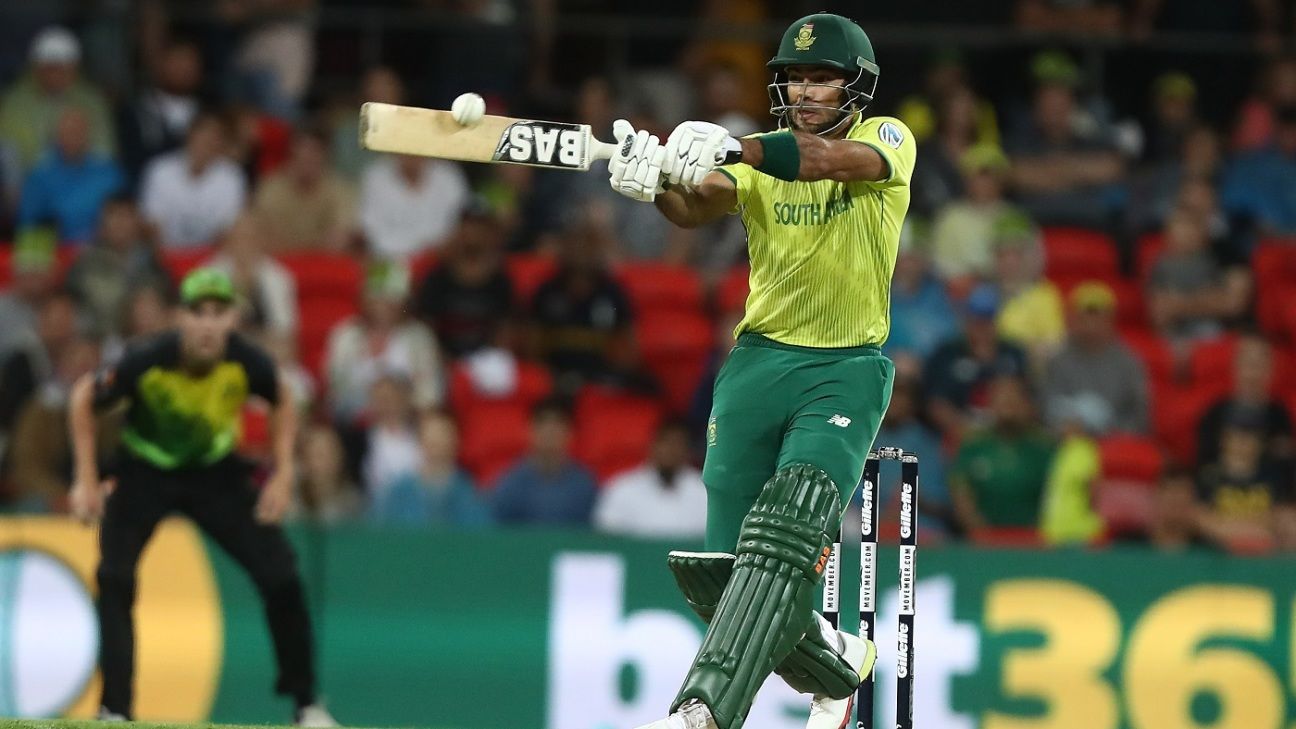Jozi Stars 230 for 3 (Hendricks 104*, Rickleton 45) beat Durban Heat 177 (va Wyk 66, Rabada 4-27) by 53 runs
Reeza Hendricks cracked the maiden century of the Mzansi Super League as Jozi Stars buried Durban Heat under a mountain of runs to climb to third place on the table with a dominant 53-run win. Asked to bat on a belter in Johannesburg, Stars’ batsmen pulverised the opposition bowlers, one after the other in a savage assault. By the time they were done, Stars were sitting on a cushion of 230 runs – 21 clear of the previous best, which had also belonged to Stars – a good 146 of which had arrived through fours and sixes.
What started out as a lesson on the art of preserving wickets and pacing a T20 innings through the early and middle overs wound up being an exhibition of end-overs batting, the likes of which can leave the opposition shellshocked. And indeed, by the time Stars were done, Heat had no idea what had hit them. Specifically, the overs between 14 and 20 were a haze, as Stars pillaged 114 runs in that time. And to think that they had already been going at nine an over, with nine wickets intact.
As it is, Durban is a treat to bat on owing to the ground’s natural topography. This is the venue of that AB de Villiers hundred, remember? The high altitude allows the ball to come on nicely to the bat, and the hardness of the surface gives batsmen the ideal pace they need off the surface. Add to that miniature boundaries, and you either have to be a genius who can conjure magic at will, or be extremely adroit with your variations. If you’re unable to tick either of those boxes, you simply close your eyes and pray for the best.
It was the last of those that was on display on Friday. Heat’s bowlers offered up an assortment of poor deliveries. They bowled too full. They fed the arc of the batsmen with the ideal amount of room. Changes in pace were sussed out early. And tighter lines were dealt with by smart movements around the crease.
Hendricks and Ryan Rickleton took minimal time to get down to business. Barring three, every over in the first ten contained at least one boundary. As one would expect with such striking, Stars’ progression wasn’t without some slice of luck. Hendricks, in particular, rode his luck early, his first three fours arriving via a powerful whip over midwicket, an inside edge to fine leg, and a leading edge through backward point.
But the streaky strokes soon made way for more meaty ones. A full-blooded shovel over midwicket by Hendricks brought up the fifty of the opening stand, in the last over of the Powerplay. a slog sweep off Keshav Maharaj over deep midwicket and a cut behind point in the same over demonstrated how much the Heat bowlers erred on either side of the wicket. With Rickleton, too, finding frequent boundaries at the other end – three fours and two sixes in 33 balls – Stars were closing in on the 100 mark at the start of the 11th over when respite finally arrived. And it took a tremendous catch – Hashim Amla falling to his right at point to snare a Rickleton cut – to end a start so good.
However, the worst was yet to come. Rassie van der Dussen provided the first glimpse of that when he cracked four successive sixes off Bokakao to the 14th over and ended it with a powerful drive through extra cover. The over cost 30, and no other bowler came close to conceding as many. Hendricks kept the punishment going with three sixes and a four in the 16th over, off Vernon Philander.
If van der Dussen’s dismissal came as a bigger relief for Heat than when Rickleton got out, they were in for an even ruder shock as Daniel Christian unleashed a boundary barrage of his own. The manner of Christian’s progression meant that Hendricks had to wait until the last over to get to the hundred despite having moved into the 90s in the 17th over.
Heat put up a brave effort in their response, especially considering they lost three wickets to Kagiso Rabada in the very first over. Everything Heat’s bowlers couldn’t discover in the first innings, Stars’ did: pace, bounce, and movement off the deck. Even so, with Johannesburg’s reputation for putting up thrilling chases, nothing could be ruled out. Morne van Wyk kept the fight alive with another six-heavy attack, but with Heat unable to plug the fall of wickets at the other end, it was a lost battle. Through the first half, Heat maintained a run rate of over 10, but by the halfway stage, they had lost six wickets. In all, Heat managed four overs of 17 runs each, and struck 17 fours and nine sixes in their innings. It made for entertaining viewing, but was nowhere close to enough as they crumbled under the magnitude of the task in front.
